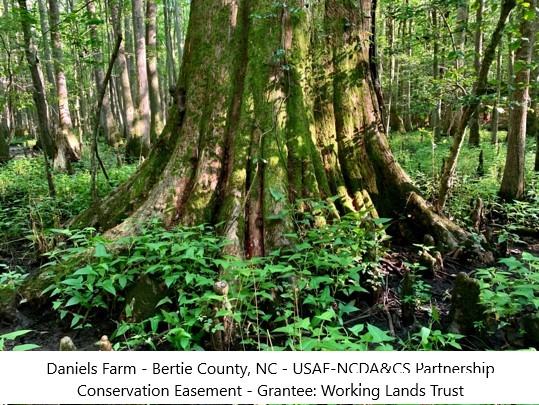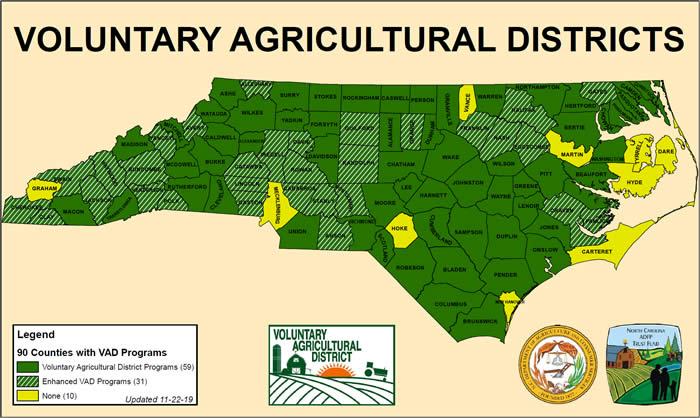
Agriculture is the number one business in North Carolina at a $92.7 billion industry. From smaller hobby farms to larger farms of production, North Carolina is blessed with rich soils and water ensuring that food options and production is a prime economic driver for the state. From blueberries, strawberries, sweet potatoes, corn, wheat, vegetables, soybeans, watermelons, and other goodness that grows or is produced in North Carolina, farms also support the health and well-being of North Carolinians. As of 2021, there are 45,000 farms in North Carolina, 80-85% of which likely identify as "small farms”. Farming matters in North Carolina, historically and currently.
People farm for a number of reasons such as passion and legacy (the farm has been in my family for a number of years or it is the only thing I have ever wanted to do), and some farm for financial or investment objectives, or a mix of the two. The NC Farm Bureau, in their segment of Ask a Farmer, reached out to learn from a local farmer about when his interest for farming developed and how; AJ Searles shared his story for how he learned to farm in Duplin County.
Like forested landowners, though each farmer is unique, some generalities are present with farmers of working lands – they share a love of the land, for the beauty of the land and what it produces, the land’s connection to community and wildlife, the privacy it affords, and for the autonomy working the soil brings.
Common barriers to farming can include lack of knowledge or experience, unfamiliarity with resources and services available, what section of the property should be managed, for what and for how long. Like, working forest landowners, farmers have similar concerns about their land such as managing for risk and liability, trespassing and litter, farm health, and the legacy of the property. And that farmers also have to be agile in today’s economy and ready to change with trends.
Topics covered in this section include:- Growing Small Farms
- Policies that Support Growing Small Farms
- Liability Knowledge for Working Farms
- Guide to Inherited Land
- Cost Share and Incentive Programs
Growing Small Farms
NC Extension offers a number of resources for growing and developing small farms. For example, Debbie Roos, an Agricultural Extension Agent, has provided a Grower's Resource List - categorized by enterprise and topic. The enterprises include: vegetables and herbs, fruits, cut flowers, beekeeping, and poultry and other livestock. Some of the topics listed include pest management, direct marketing, and irrigation.Another resource includes growing local food for new farmers. The site offers information toward local food production, marketing tips and where to sell locally.
Knowledge about the use of cover crops versus cash crops can support long-term farming. A way to increase the yield of an area, is to grow cover crops, such as vegetables like radishes, onions, spinach, or quick grain crop cereals such as rye, millet, or buckwheat. Cover crops, sown following the harvest of a cash crop like corn, cotton, wheat, soybean, fruit and some vegetables, are designed to slow erosion, improve soil health, enhance water availability, dampen weeds, help control pests and diseases, increase biodiversity and bring a host of other benefits to an area of the farm.
Policies that Support Growing Small Farms

- Voluntary Agricultural Districts (VAD) - A program designed to encourage and protect commercial agriculture. Administered at the county level. Basic requirement is that the land be enrolled in a PUV program or meet other qualifications.
- Enhanced Voluntary Agricultural Districts (EVAD)- is a VAD formed of one or more farms that are subject to an irrevocable ten-year agreement to limit development. In addition to VAD benefits landowners may be eligible to receive a higher percentage of cost-share under the Agricultural Cost Share Program-as high as 90 percent assistance.The North Carolina Department of Agricultural has published an update on VAD and EVAD.
- Present Use Value (PUV) is the value of land in its current use as agricultural land, horticultural land, or forestland, based solely on its ability to produce income and assuming an average level of sound management. PUV tax deferment may be referred to as PUV, Land Use, Farm Use, or simply a “tax break”. A voluntary program, PUV requires compliance with certain rules by the owner in exchange for tax deferment. As long as the owner(s) continues to meet all the statutory requirements set by North Carolina General Statutes 105- 277(series), the property will remain in present use value.Annually, at least one-eighth of the properties in PUV are reviewed for compliance. The period of the review process is based on the average of the preceding three year's data. The county may ask for any income, production, and/or sound management documentation for the three preceding years as part of the review. Forestry may cover a greater time period because the growth cycle for timber encompasses many years.
- Wildlife Conservation Lands Program Another program that operates similarly is the NC Wildlife Resources Commission Wildlife Conservation Lands Program (WCLP).The Wildlife Conservation Lands Program (WCLP) offers landowners a potential reduced property tax assessment in exchange for managing priority wildlife habitats or priority wildlife species. Landowners with at least 20 contiguous acres of priority habitat or land being utilized by priority species, and who are willing to conserve and maintain that habitat may be eligible. The Commission's Technical Assistance Biologists (TABs) can work with landowners to develop management plans for the Forest Stewardship Program that include wildlife habitat as a significant component of the landowner's plan.
Liability Knowledge for Working Landowners
Landowners want knowledge about how to manage for risk when owning property. Understanding risks and the various levels of risks are important topics for a landowner to understand. A landowner often needs to ask about the associated liabilities with any activities that he or she may engage. Andrew Branan, a professor at NC State University, offers a webinar on Landowner Liability. Hosted by the NC Extension Forestry Department, the webinar includes matters of trespass and what constituents the legal sufficiency of boundary and hazard marking. Landowner liability webinar.Supplemental reading – Ownership Rights in Property Management.
Guide to Inherited Land
Andrew Branan, a professor at NC State University, presents a guide book for anyone who has recently inherited farm or forested land. The workbook provides topics and templates concerning the transfer and management of interests in farm or forest land. A copy of the guidebook can be downloaded from the site.Cost Share and Incentive Programs
- Agriculture Cost Share Program (ACSP) Non-point source pollution is a major cause of water quality problems in North Carolina and in much of the United States. In many places, damage to our water resources comes from soil erosion, excessive fertilizer use, animal waste contamination, and improper use of agricultural chemicals. The North Carolina Agricultural Cost Share Program (ACSP) helps address nonpoint source pollution by providing technical and financial resources through a voluntary, incentive-based program designed to improve water quality through the installation of various best management practices (BMPs) on agricultural lands directly involved with agriculture production.
- Agricultural Water Resources Assistance Program (AgWRAP)
If you are a landowner or renter of an existing agricultural operation operating for more than one year, you are eligible to participate. Cooperator must make less than $250,000 or have 75% or more of their income supported through agricultural operations. The purposes of the AgWRAP are to:
- Identify opportunities to increase water use efficiency, availability and storage
- Implement best management practices (BMPs) to conserve and protect water resources
- Increase water use efficiency
- Increase water storage and availability for agricultural purposes By taking action to increase water use efficiency, storage and availability as well as conserve and protect water resources, landowners are directly contributing to the long-term resilience and sustainability of agriculture in North Carolina.
- Community Conservation Assistance Program (CCAP) A voluntary, incentive-based program designed to improve water quality through the installation of various best management practices (BMPs) on urban, suburban and rural lands not directly involved with agriculture production.Eligible landowners may include homeowners, businesses, schools, parks and publicly owned lands.Rapid urbanization affects water quality becomes important as North Carolina's land use continues to change. CCAP can help educate landowners on water quality, stormwater management and retrofit practices to treat stormwater runoff.
- Natural Resource Conservation Service Programs listed for Working Forests may also apply for agricultural lands.
Resources
- NC Farm School - for new farmers wanting to pursue their passion.
- Growers Assistance Information Network (GAIN) - provide information to producers whose contracts with integrators are affected by economic conditions.